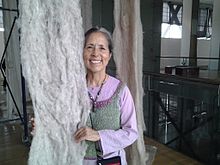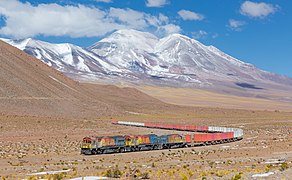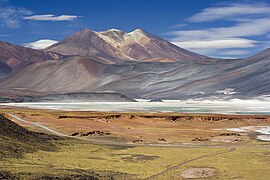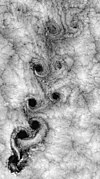Portal:Chile
| Main page | Assessment | Articles | Templates | Translation | Noticeboard | To Do List | Portal |
The Chile Portal

Chile, officially the Republic of Chile, is a country in western South America. It is the southernmost country in the world and the closest to Antarctica, stretching along a narrow strip of land between the Andes Mountains and the Pacific Ocean. Chile had a population of 17.5 million as of the latest census in 2017 and has a territorial area of 756,102 square kilometers (291,933 sq mi), sharing borders with Peru to the north, Bolivia to the northeast, Argentina to the east, and the Drake Passage to the south. The country also controls several Pacific islands, including Juan Fernández, Isla Salas y Gómez, Desventuradas, and Easter Island, and claims about 1,250,000 square kilometers (480,000 sq mi) of Antarctica as the Chilean Antarctic Territory. The capital and largest city of Chile is Santiago, and the national language is Spanish.
Spain conquered and colonized the region in the mid-16th century, replacing Inca rule, but failed to conquer the independent Mapuche people who inhabited what is now south-central Chile. Chile emerged as a relatively stable authoritarian republic in the 1830s after their 1818 declaration of independence from Spain. During the 19th century, Chile experienced significant economic and territorial growth, putting an end to Mapuche resistance in the 1880s and gaining its current northern territory in the War of the Pacific (1879–83) by defeating Peru and Bolivia. In the 20th century, up until the 1970s, Chile underwent a process of democratization and experienced rapid population growth and urbanization, while relying increasingly on exports from copper mining to support its economy. During the 1960s and 1970s, the country was marked by severe left-right political polarization and turmoil, which culminated in the 1973 Chilean coup d'état that overthrew Salvador Allende's democratically elected left-wing government. This was followed by a 16-year right-wing military dictatorship under Augusto Pinochet, which resulted in more than 3,000 deaths or disappearances. The regime ended in 1990, following a referendum in 1988, and was succeeded by a center-left coalition, which ruled until 2010.
Chile has a high-income economy and is one of the most economically and socially stable nations in South America, leading Latin America in competitiveness, per capita income, globalization, peace, and economic freedom. Chile also performs well in the region in terms of sustainability of the state and democratic development, and boasts the second lowest homicide rate in the Americas, following only Canada. Chile is a founding member of the United Nations, the Community of Latin American and Caribbean States (CELAC), and the Pacific Alliance, and joined the OECD in 2010. (Full article...)
Los Ángeles Negros (English: The Black Angels) are a Chilean pop ballad band formed in San Carlos de Chile in 1968. The band's best-known line-up consisted of singer Germaín de la Fuente, guitarist Mario Gutiérrez, keyboardist Jorge González, bassist Miguel Ángel "Nano" Concha, and drummer Luis Ortiz. Their music is a blend of boleros, psychedelic funk and rock music, known as Balada rockmántica.
The original members of the band included three teenagers and a worker from a local school. After winning a local competition in June 1968, they recorded and released their first single, "Porque Te Quiero", which attracted the attention of Chile's Odeon Records representatives, urging two of the four members of the band to record an album with three other studio musicians. As a result, they recorded Porque Te Quiero in 1969, and several chart-topping singles across Latin America in the following years. (Full article...)Selected biography -
Cecilia Vicuña (born 1948) is a Chilean poet and artist based in New York and Santiago, Chile.
Her work is noted for themes of language, memory, dissolution, extinction and exile. Critics also note the relevance of her work to the politics of ecological destruction, cultural homogenization, and economic disparity, particularly the way in which such phenomena disenfranchise the already powerless. Her commitment to feminist forms and methodologies is considered to be a unifying theme across her diverse body of work, among which her fibre art quipus, knotted or unknotted strings, palabrarmas and precarios, made from natural, delicate materials, stand out. Her practice has been specifically linked to the term eco-feminism. (Full article...)Selected article -
General images
Did you know (auto generated)

- ... that Salar de Pajonales in Chile has been used as an analogue for environments on Mars?
- ... that Daniela Ceballos worked with the Football Federation of Chile to supervise safety protocols during the COVID-19 pandemic while playing football herself?
- ... that Salar de Pedernales in Chile features dark slope streaks resembling dark slope streaks on Mars?
- ... that Peruvian foreign minister Manuel María Gálvez Egúsquiza was arrested by Chilean troops for refusing to sign peace with the cession of territory during the War of the Pacific?
- ... that Angelito de Canal 13, the mascot of the Chilean television network Canal 13, was inspired by its creator's son?
- ... that Earle M. Chiles, a businessman and philanthropist from Portland, Oregon, was also a senator of the board of Ludwig Maximilian University in Munich, Germany?
Topics
Categories
Recognized content
| This is a list of recognized content, updated weekly by JL-Bot (talk · contribs) (typically on Saturdays). There is no need to edit the list yourself. If an article is missing from the list, make sure it is tagged (e.g. {{WikiProject Chile}}) or categorized correctly and wait for the next update. See WP:RECOG for configuration options. |
Featured articles
- Chilean battleship Almirante Latorre
- Almirante Latorre-class battleship
- Cerro Azul (Chile volcano)
- Calabozos
- El Tatio
- Chilean cruiser Esmeralda (1883)
- Guallatiri
- Mount Hudson
- Laguna del Maule (volcano)
- Mothers of the Disappeared
- Ojos del Salado
- Pali-Aike volcanic field
- Pisco sour
- South American dreadnought race
- Taapaca
Good articles
- 2010 Pichilemu earthquakes
- 2018 Santiago ePrix
- Agustín Ross Cultural Centre
- Angata
- Los Ángeles Negros
- Apacheta-Aguilucho volcanic complex
- Argentine–Chilean naval arms race
- Atamu Tekena
- Orlando Bosch
- Lorenza Böttner
- Sara Braun
- Monte Burney
- Battle of Caldera Bay
- Felipe Camiroaga
- Chilean battleship Capitán Prat
- Carménère
- José María Caro Martínez
- Chile at the 2014 Winter Paralympics
- Coat of arms of Pichilemu
- Dutch expedition to Valdivia
- El Laco
- Milton Friedman
- Fueguino
- Irruputuncu
- Laguna Miscanti
- Laguna del Negro Francisco
- Lascar (volcano)
- Lastarria
- Lazufre
- Licancabur
- Licancabur Lake
- Llullaillaco
- Nevado de Longaví
- Manuel Foster Observatory
- Monturaqui
- Irene Morales
- John Thomas North
- Obligation to Negotiate Access to the Pacific Ocean
- Olca-Paruma
- USS Oneota (1864)
- La Pacana
- Parinacota (volcano)
- Patio 29
- Pichilemu
- Colegio de la Preciosa Sangre de Pichilemu
- Salar de Punta Negra
- Reclus (volcano)
- Murders of María José Reyes and Juan Duarte
- Sammis Reyes
- Riro Kāinga
- Sairecabur
- Salar Ignorado
- San Pedro (Chile volcano)
- Socompa
- Sollipulli
- Tacora
- Tilocálar
- Nevado Tres Cruces
- Tupungatito
- Tuyajto Lake
Featured pictures
-
360-degree Panorama of the Southern Sky edit
-
A 360 degree panorama of a unique cloudscape over La Silla
-
Culpeo MC
-
FCAB EMD GT22CU-3 San Pedro - Ascotan
-
Laguna Miñiques, Chile, 2016-02-08, DD 33-38 PAN
-
Laser Towards Milky Ways Centre
-
Miscanti Lagoon near San Pedro de Atacama Chile Luca Galuzzi 2006
-
Moai Rano raraku
-
SQM GE 289A Boxcab Carmelita - Reverso
-
Volcán San Pedro, Chile, 2016-02-09, DD 18
-
Vortex-street-1
WikiProjects
Related portals
New articles
Rules | Match log | Results page (for watching) | Last updated: 2024-06-05 19:58 (UTC)
Note: The list display can now be customized by each user. See List display personalization for details.
- Jaqueline Weber (edit | talk | history | links | watch | logs | tools) by Pietaster (talk · contribs · new pages (3)) started on 2024-06-05, score: 14
- PKS 0529-549 (edit | talk | history | links | watch | logs | tools) by Galaxybeing (talk · contribs · new pages (21)) started on 2024-06-05, score: 16
- Operation Toy Drop (edit | talk | history | links | watch | logs | tools) by Di (they-them) (talk · contribs · new pages (4)) started on 2024-06-05, score: 16
- 2025 AFC U-20 Asian Cup (edit | talk | history | links | watch | logs | tools) by Qby (talk · contribs · new pages (4)) started on 2024-06-03, score: 16
- HYPHEN (edit | talk | history | links | watch | logs | tools) by Krimpoka (talk · contribs · new pages (1)) started on 2024-06-03, score: 28
- Erica Hawley (edit | talk | history | links | watch | logs | tools) by Hildreth gazzard (talk · contribs · new pages (194)) started on 2024-06-03, score: 14
- Adolfo Roitman (edit | talk | history | links | watch | logs | tools) by Eracino koal (talk · contribs · new pages (1)) started on 2024-06-03, score: 14
- List of Peruvian coups d'état (edit | talk | history | links | watch | logs | tools) by AlejandroFC (talk · contribs · new pages (64)) started on 2024-06-02, score: 28
- Loreto Lyon (edit | talk | history | links | watch | logs | tools) by TomasVial (talk · contribs · new pages (1)) started on 2024-06-02, score: 43
- Agrosuper (edit | talk | history | links | watch | logs | tools) by FrederickEvans (talk · contribs · new pages (28)) started on 2024-06-02, score: 51
- Jon Benjamin (diplomat) (edit | talk | history | links | watch | logs | tools) by Moscow Mule (talk · contribs · new pages (106)) started on 2024-06-01, score: 31
- Premios Pulsar (edit | talk | history | links | watch | logs | tools) by JuliánLeiva66 (talk · contribs · new pages (5)) started on 2024-05-31, score: 43
- Valentina Meriño (edit | talk | history | links | watch | logs | tools) by Maniakilljoy97 (talk · contribs · new pages (11)) started on 2024-05-30, score: 23
- History of Peru (1919–1930) (edit | talk | history | links | watch | logs | tools) by AlejandroFC (talk · contribs · new pages (64)) started on 2024-05-30, score: 14
- Career of Cristiano Ronaldo (edit | talk | history | links | watch | logs | tools) by Tpbradbury (talk · contribs · new pages (3)) started on 2024-05-25, score: 14
- Ewald Frank (edit | talk | history | links | watch | logs | tools) by Yavaa (talk · contribs · new pages (1)) started on 2024-05-20, score: 16
- Lizz (edit | talk | history | links | watch | logs | tools) by Thriley (talk · contribs · new pages (77)) started on 2024-05-30, score: 14
- British Empire (horse) (edit | talk | history | links | watch | logs | tools) by TabbyLadrona (talk · contribs · new pages (18)) started on 2024-05-29, score: 14
- Aristocratic Republic (Peru) (edit | talk | history | links | watch | logs | tools) by AlejandroFC (talk · contribs · new pages (64)) started on 2024-05-29, score: 14
- National Reconstruction (Peru) (edit | talk | history | links | watch | logs | tools) by AlejandroFC (talk · contribs · new pages (64)) started on 2024-05-29, score: 14
- SPECULOOS-3 b (edit | talk | history | links | watch | logs | tools) by InTheAstronomy32 (talk · contribs · new pages (23)) started on 2024-05-26, score: 16
- FloyyMenor (edit | talk | history | links | watch | logs | tools) by Floppykart (talk · contribs · new pages (33)) started on 2024-05-28, score: 31
- IFCPF Americas Championships (edit | talk | history | links | watch | logs | tools) by Teterev53 (talk · contribs · new pages (89)) started on 2024-05-28, score: 14
- Eduardo Contreras Mella (edit | talk | history | links | watch | logs | tools) by Jmanlucas (talk · contribs · new pages (27)) started on 2024-05-28, score: 28
- Praocis (edit | talk | history | links | watch | logs | tools) by Flora and fauna man (talk · contribs · new pages (1)) started on 2024-05-28, score: 16
- History of Peru (1821–1842) (edit | talk | history | links | watch | logs | tools) by AlejandroFC (talk · contribs · new pages (64)) started on 2024-05-28, score: 20
- Louise Dewaet (edit | talk | history | links | watch | logs | tools) by Lachie23 (talk · contribs · new pages (10)) started on 2024-05-28, score: 20
- Jewish Archive of Chile (edit | talk | history | links | watch | logs | tools) by Igallards7 (talk · contribs · new pages (3)) started on 2024-05-27, score: 43
- Zoe Díaz (edit | talk | history | links | watch | logs | tools) by Lachie23 (talk · contribs · new pages (10)) started on 2024-05-27, score: 20
- Miss Cosmo International 2024 (edit | talk | history | links | watch | logs | tools) by KamyyFallon (talk · contribs · new pages (1)) started on 2024-05-25, score: 16
- Idea-Tec (edit | talk | history | links | watch | logs | tools) by Celinea33 (talk · contribs · new pages (1)) started on 2024-05-25, score: 31
- Alto Río building collapse (edit | talk | history | links | watch | logs | tools) by Toledo1970 (talk · contribs · new pages (2)) started on 2024-05-24, score: 28
- Job Bogmis (edit | talk | history | links | watch | logs | tools) by Das osmnezz (talk · contribs · new pages (32)) started on 2024-05-24, score: 35
- List of country subdivision flags in South America (edit | talk | history | links | watch | logs | tools) by For the nth time (talk · contribs · new pages (2)) started on 2024-05-23, score: 30
- 2019 WRC2 Championship (edit | talk | history | links | watch | logs | tools) by Rally Wonk (talk · contribs · new pages (37)) started on 2024-05-24, score: 14
- Sergio Hernán Pérez de Arce Arraigada (edit | talk | history | links | watch | logs | tools) by Ababil0811 (talk · contribs · new pages (3)) started on 2024-05-24, score: 18
- Simon of the Mountain (edit | talk | history | links | watch | logs | tools) by Οἶδα (talk · contribs · new pages (69)) started on 2024-05-24, score: 31
- Baile Funk Experience (edit | talk | history | links | watch | logs | tools) by Hyck (talk · contribs · new pages (1)) started on 2024-05-23, score: 14
- Catholic Church sexual abuse cases in Venezuela (edit | talk | history | links | watch | logs | tools) by Borboteo (talk · contribs · new pages (9)) started on 2024-05-23, score: 16
- Sixties Song (edit | talk | history | links | watch | logs | tools) by TabbyLadrona (talk · contribs · new pages (18)) started on 2024-05-22, score: 20
- David Pérez (footballer) (edit | talk | history | links | watch | logs | tools) by Das osmnezz (talk · contribs · new pages (32)) started on 2024-05-22, score: 15
- Lara Casas (edit | talk | history | links | watch | logs | tools) by Lachie23 (talk · contribs · new pages (10)) started on 2024-05-22, score: 20
Associated Wikimedia
The following Wikimedia Foundation sister projects provide more on this subject:
-
Commons
Free media repository -
Wikibooks
Free textbooks and manuals -
Wikidata
Free knowledge base -
Wikinews
Free-content news -
Wikiquote
Collection of quotations -
Wikisource
Free-content library -
Wikiversity
Free learning tools -
Wikivoyage
Free travel guide -
Wiktionary
Dictionary and thesaurus
























































